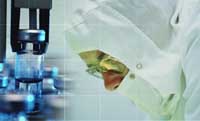Britain to seek public opinion on human-animal stem cell studies
Britain said Thursday it will conduct a public consultation on the issue of whether scientists should be allowed to create human stem cells from animal eggs.

The Human Fertilisation and Embryology Authority said in a statement that only after the consultation process was complete in the autumn would it make a decision on whether to approve the experiments.
"The law in this area is far from explicit, and this area of research would be a significant step change in UK science," Angela McNab, HFEA's Chief Executive said in a statement. "It would be wrong to make an immediate judgment on these complex and controversial matters before we have built up a proper body of evidence," said McNab.
Leading stem cell experts warned last week that banning such research would jeopardize the search for cures to degenerative diseases like Alzheimer's and Motor Neurone diseases.
Prime Minister Tony Blair has weighed in to the debate, saying the government was not necessarily "dead set" against such research. He admitted there were "difficult" issues involved, but wanted to see stem cell research progress, if there were potential health benefits.
Last month, in a report published by the Department of Health, the government proposed outlawing the creation of hybrid embryos combining human and animal genetic material.
Several stem cell experts submitted applications for a license to create human stem cells using animal eggs. The process involves injecting an empty cow or rabbit egg with human DNA. That would produce an egg with human genetic material inside, with minute traces of animal genetic material.
After a burst of electricity, the egg would be tricked into dividing regularly, becoming a very early embryo from which stem cells could be extracted. In the resulting egg, there would be 13 animal genes versus 30,000 human genes.
Scientists insist it would be a human embryo made in the shell of an animal egg. They believe using animal eggs would solve the problem caused by the shortage of human eggs. The resulting embryos would only be developed for a maximum of 14 days.
"Although we are naturally disappointed that the HFEA has not recommended that our research applications go to the licensing committee, we are happy with their decision to consult both public and scientific opinion," said Dr. Stephen Minger, director of the Stem Cell Biology laboratory at King's College, London, reports AP.
Opponents of the proposed experiments also welcomed the decision. "We all want cures for diseases, but there are ethical principles to be respected," said Dr. Andrew Ferguson, an ethics specialist at the Christian Medical Fellowship.
Subscribe to Pravda.Ru Telegram channel, Facebook, RSS!


